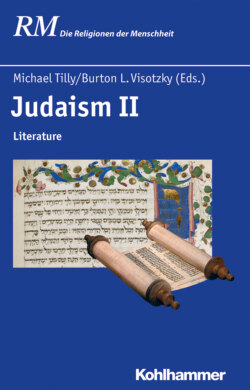Читать книгу Judaism II - Группа авторов - Страница 77
На сайте Литреса книга снята с продажи.
6 Poetic Writings
ОглавлениеPsalm 15150 is a composition based on 1 Sam (= LXX 1 Kgs) 16:1–13; 17:14; 2 Sam (= LXX 2 Kgs) 7:8; 2 Chr 29:6; Ps 78 (LXX 77), 70 and 89 (LXX 88), 20, which supplements the Psalter – which was already fixed in the second century BCE. The psalm is contained only in the Greek and Syriac psalter; a Hebrew version is found in 11QPsa, col. 28.1–5. These two independent text versions, originating in second-century BCE Judea, reflect this older (Hebrew) tradition.
Eighteen compositions are handed down as Psalms of Solomon,51 originally written in Hebrew and translated into Greek by Jews of an anti-Hasmonean persuasion who, affected by the end of the Hasmonean dynasty, the taking of Jerusalem by Pompey, and the desecration of the temple precincts in 63 BCE, combined a pessimistic interpretation of history with incipient messianic hopes.
The collection is pseudepigraphically ascribed to King Solomon and exists only in medieval Greek and Syriac manuscripts. It is not found in Jewish collections nor in Christian Bible codices.52 The allusions to local historical events (cf. 2:1–14:19ff.; 4:1) point to Jerusalem as the place of composition and to their origin in the second third of the first century BCE. Throughout the Psalms there is parallelismus membrorum, typical of Hebrew poetry. Their vocabulary and phraseology also go back to the language of the psalms and prophets of the Old Testament, with lament (4; 5; 7; 8; 9; 12; 17), thanksgiving (2; 13; 15; 16), and hymns (3; 6; 10; 11; 14; 18). Thematically, the compositions focus on the opposite fates of the righteous (1:5, 12) and the ungodly (2:26–31) according to their deeds; as well as the rule of the God of Israel.
Because of their polemic against the wickedness and impurity of (Roman) non-Jews, Sadducees, the priestly aristocracy, and the Hasmonean rulers (4:1; 7:2), the Psalms of Solomon are generally ascribed to »Pharisaic« circles. In Psalms 17 and 18 we find the oldest traces of a messianic tradition which combines the promise of the eternal covenant of the Davidic dynasty with the notion of the king’s anointing as divine election. The events of 63 BCE are retrospectively evaluated as a just punishment of Israel by its God. The poems in general are concerned with a current situation that was felt to be unfair and oppressive, by means of the instruction, edification, and exhortation of its pious Jewish addressees. It is not likely, however, that the Psalms of Solomon were used liturgically.
The didactic wisdom poem of Pseudo-Phocylides53 contains doctrines for life, in the form of short single sentences with rules of ethical behavior. The pseudepigraphal composition of proverbs may be viewed as an example of a »cross-cultural tradition of didactic poetry«54 from the area of tradition of Hellenistic-Jewish antiquity. In 219 hexameters, in a total of 230 single-line verses in the Ionic dialect, we find numerous admonitions and rules for an exemplary good life.
Literary authorization of the text is provided by pseudepigraphal connection with the didactic poet Phocylides of Miletus (mid-6th cent. BCE). The place of composition is generally thought to be Egypt or Alexandria (cf. § 102); the first century CE would appear to be the most probable period for its appearance. The proverbs combine traditions from the realm of Hellenistic/Greek popular ethics with biblical/Jewish content and motifs, while specifically Jewish identity features are not mentioned. Such a fusion testifies to the intensive cultural contact and interaction between Jews and Greeks, especially in the western Diaspora.
Pseudo-Phocylides does not want to reveal his Judaism explicitly. Nonetheless, the Jewish scriptures in Greek are recognizable as his literary sources. In addition, numerous unmarked echoes and agreements in content with literary works by contemporary Greek ethicists may be discerned. This didactic poem propagated a moral teaching that transcended Jewish ethics and was compatible with the Hellenistic majority culture. This coupled with an anthropology derived from the biblical-Jewish creation tradition.
Ezekiel the Tragedian55 is the author of a Greek Moses drama in iambic trimeters, preserved in fragments, under the title Exagogé.56 This work was composed in Alexandria between 250 and 100 BCE, on the basis of the Septuagint, converting parts of Exodus (1–24) and Numbers (10–33) into Greek drama. It is regarded as the oldest known dramatization of biblical material.
